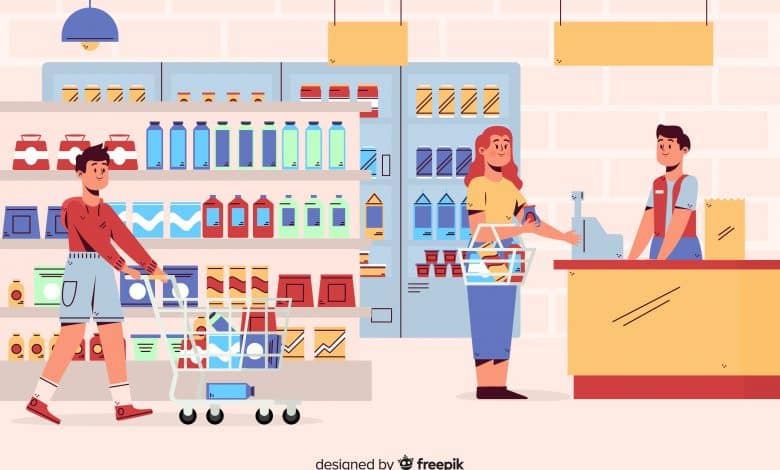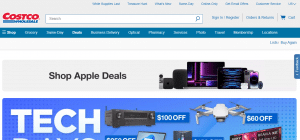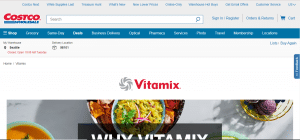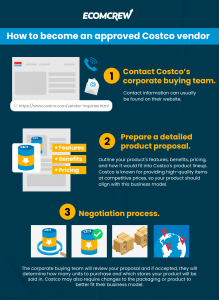How to Sell Your Products in Costco

Costco Wholesale Corporation is renowned for operating a chain of membership-only big-box retail stores. For brands and product developers looking to expand their market reach and boost sales, Costco offers an exceptional opportunity.
The company's strong customer base, coupled with its reputation for quality and value, makes it a highly desirable platform for product sales.
Consequently, considering Costco as a sales platform can be a game-changing decision for brands seeking substantial market penetration and increased visibility.
In this article, we'll guide you on how to sell your products in Costco, explaining the process and the benefits involved.
Why Would You Want to Sell Your Products in Costco?
Founded in 1976 under the name “Price Club,” Costco has grown to become the fifth-largest retailer in the world. Its diverse product offering attracts a broad customer base, making it a hotspot for high sales volumes.

Costco is recognized for its commitment to selling high-quality products at low prices. It achieves this by purchasing items in bulk, which allows it to offer significant discounts to its members.
With its large, dedicated membership, products placed in Costco can gain immediate exposure to millions of potential customers.
Furthermore, the company's reputation for quality can enhance the perceived value of your product, influencing consumers' purchasing decisions in your favor.

Shoppers browse the wide array of products at a bustling Costco warehouse. Beyond these brick-and-mortar locations, the multinational corporation also caters to customers globally with its robust e-commerce platform, seamlessly merging physical and digital retail experiences.
Can You Sell Your Own Products on Costco?
Yes, you can potentially sell your own products at Costco. However, the process requires you to become an approved vendor and meet Costco's stringent quality and pricing standards.
To become an approved vendor, you need to contact Costco's corporate buying team. The contact information can usually be found on their website. You should prepare a detailed product proposal that outlines your product's features, benefits, pricing, and how it would fit into Costco's product lineup. Keep in mind that Costco is known for providing high-quality items at competitive prices, so your product should align with this business model.
Once you've submitted your proposal, the corporate buying team will review it and decide whether to accept your product. If accepted, they will determine how many units to purchase and in which stores your product will be sold. The negotiation process can be lengthy, and there's no guarantee that your product will be accepted.
Furthermore, Costco does not accept all types of products. Certain categories are excluded, such as single books, music, and art, among others. Also, bear in mind that even if your product does get accepted, Costco may require changes to the packaging or product to better fit their business model.
Lastly, Costco also runs an online marketplace where individuals and small businesses can sell their products. However, these vendors also need to meet Costco's high standards and be approved by the Costco buying team.
Vendor Requirements for Selling Products on Costco
Selling products on Costco requires several documents, including
1. Business License
This document verifies your business's legality. It is essential for tax purposes and ensures compliance with local, state, and federal regulations.
2. Product Liability Insurance Certificate
Costco requires this document to protect itself from any liabilities that may arise due to the sale of your product. This insurance covers any damages or injuries that your product might cause.
3. Vendor Agreement
This is a contract between you and Costco, detailing the terms and conditions of your business relationship. It typically covers pricing, delivery, and payment terms.
4. Product Specification Sheet
This contains detailed information about your product, including its ingredients or components, manufacturing process, and any certifications. It helps Costco understand the product better.
To prepare these documents, ensure they are up-to-date and accurately reflect your business and product.
Getting Your Products Approved by Costco
The approval of your products by Costco depends on various factors:
- Product quality and value. Costco is renowned for its high-quality products. They seek products that offer significant value to their customers.
- Ability to supply in volume: Costco stores are large and have a high turnover rate, so suppliers must be able to meet demands of bulk selling.
- Compliance with Costco's policies. Your products must adhere to Costco's policies and guidelines, including their ethical sourcing and sustainability policies.
- Market demand. Costco is more likely to approve products that have a high market demand or fill a gap in their product lineup.
- Packaging and presentation: they have specific requirements for packaging, for example, bulk packaging is a common feature at Costco.
While there's no guarantee for approval, following these guidelines can increase your chances. Furthermore, ensuring your product is unique, competitively priced, and well-packaged can enhance your application.
Product Categories Not Allowed on Costco
Costco is widely respected for its curated product selection, ensuring the highest quality and safety for their customers.
However, due to ethical, legal, and safety concerns, there are specific categories not permitted for sale, ranging from firearms and tobacco products to live animals and hazardous materials.
- Firearms and ammunition. Costco prohibits the sale of firearms, ammunition, and related accessories due to safety concerns and legal restrictions.
- Tobacco products. Costco does not sell tobacco products due to public health risks and regulatory constraints.
- Live animals. The sale of live animals is not allowed as it poses ethical, welfare, and health concerns.
- Counterfeit items. Costco strictly prohibits the sale of counterfeit goods to protect customers and maintain brand reputation.
- Adult content and materials. Costco does not allow adult-oriented products to maintain a family-friendly shopping environment.
- Hazardous materials. The sale of hazardous materials is restricted due to safety and legal regulations.
- Recalled products. Costco does not allow the sale of recalled products to ensure customer safety and comply with consumer protection laws.
To align your product with Costco's guidelines, review their detailed vendor policies and ensure your product complies with all legal and safety regulations. Focus on offering high-quality, family-friendly, and safe items that cater to the needs of Costco's diverse customer base.
How to Sell to Costco Canada?
Selling to Costco in the United States and Canada involves similar overall processes and requirements, but there are some differences due to regulations and market preferences.
While the general process of vendor application and approval is likely similar, there might be region-specific procedures or documentation required.
There are differences in regulations and compliance standards between the U.S. and Canada. For instance, labeling requirements in Canada are stricter, with bilingual (English and French) labeling being mandatory for most products.
Besides the bilingual labeling requirement, there may be other packaging differences influenced by Canadian regulations or consumer preferences.
Also, if you're a US based supplier, you might want to take into account pricing and currency, product selection and volume, and lastly, logistics and distribution channels especially if you're shipping products across the border.
Pros and Cons of Selling Products on Costco
Discover the numerous benefits of selling products on Costco, a platform that offers unparalleled access to a vast customer base and opportunities for increased sales volume.
Pros
- Wide customer base
- High sales volume
- Strong brand reputation
- Access to Costco's loyal customer base
- Opportunities for product exposure
Cons
- Strict product requirements and standards
- Limited product selection
- High competition among suppliers
- Negotiating lower prices and margins
- Limited control over pricing and marketing strategy
Personal success stories include the popular brand ‘Kirkland Signature,' Costco's private label that offers a range of high-quality products at competitive prices.
Another example is ‘Vitamix,' a high-performance blender that gained popularity and significantly increased sales through exposure at Costco warehouses.

By selling products on Costco, vendors can leverage the platform's advantages to achieve similar success and growth.
Conclusion
By choosing Costco as a sales platform, you're not only expanding your business horizon but also aligning with a trusted brand known for its commitment to customer satisfaction.
Do you think selling on Costco will be advantageous to brands?




